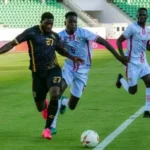Equatorial Guinea has included striker Emilio Nsue in their squad for the 2026 World Cup qualifiers against Tunisia, despite a FIFA suspension. The match is scheduled for this Wednesday at 7 p.m. GMT, marking the third day of the qualifiers.
FIFA’s Suspension and Nsue’s Eligibility Issues
FIFA’s ten-page report, released earlier this week, justified the six-month suspension of Nsue, which was imposed on May 24.
The report highlighted that Nsue, who previously played for Spain’s youth teams, did not follow the proper procedure for changing his sporting nationality before representing Equatorial Guinea from March 24, 2013.
Furthermore, the Intercity forward ignored a prior warning from FIFA, playing for Equatorial Guinea for 11 years despite being ineligible.
Nsue, the top scorer of CAN 2023, faces significant scrutiny as a result.
Equatorial Guinea’s Defiant Stance
Despite FIFA’s ruling, Equatorial Guinea’s coach Juan Micha has named Nsue in the squad for the matches against Tunisia and Malawi.
In a bold move, Nsue traveled to Radès, Tunisia, and participated in training sessions with the team.
The Equatoguinean Football Federation (Feguifut) even published photos and videos featuring Nsue, who came out of retirement on May 20, further showcasing their defiance.
Tunisia’s Response and Potential Consequences
Tunisia, anticipating Nsue’s participation in the match, is preparing to file an appeal before kickoff, according to Sportnewsafrica. Should Nsue play, Equatorial Guinea risks facing another defeat by default, which would severely impact their qualification prospects.
The team has already suffered two defeats by default, one against Namibia and another against Liberia, in both instances involving Nsue.
The Stakes for Equatorial Guinea
Equatorial Guinea’s provocative stance and the potential fallout from fielding Nsue add a layer of tension to the World Cup qualifiers.
If the appeal by Tunisia is successful and Equatorial Guinea is handed another default loss, their chances of progressing in the qualifiers will be significantly jeopardized.
This ongoing controversy highlights the critical importance of adhering to FIFA regulations and the potential repercussions of defiance on the international stage.
As the football world watches, the unfolding events in Radès could set a precedent for future cases involving player eligibility and national representation.
The outcome of this match and the associated legal battles may have far-reaching implications for Equatorial Guinea’s footballing ambitions.










